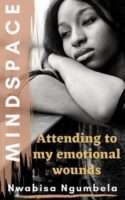Even though black people are starting to understand that depression is real, the stigma around it is still rife. It is not uncommon to hear comments such as, moody or lazy. Because of this, we often reproach ourselves for wanting to reach out, we think ourselves too self-indulgent. Suffocating but still feeling you can’t reach out for a life line has to be the loneliest feeling in the history of mankind. I am fortunate to have come to the realisation that not only can I admit that I can no longer cope, I am also able to get help. I will tell you where it all began.
My woes began when I was just six-years-old. Mama took me to visit a close friend of hers in the village. During the visit, I needed to use the restroom. The latrine in their yard was rickety. Mama’s friend reasoned that it would be dangerous to go alone. So, she asked her teenage son to take me. When I had finished responding to nature’s call, he walked me further into the garden where the corn patch shielded us from passersby. He pulled down my green fleece track pants and rubbed his penis on my vagina until sticky stuff came out of it. I knew what he was doing wrong. Even so, when he asked if it was nice, I said yes. He never asked me to, but I knew not to tell. I worried that I might get into trouble.
When I was eight-years-old, I had just come back from school, made myself a late lunch of brown bread, I was washing it down with Oros, when I heard a commotion on the lawn, it was my parents, they were fighting. Mom was indecent, her beige bra was bloody, one strap had snapped. Her skirt was torn. Over the years scenes like that would be a daily occurrence in my home. My older brother quickly assumed the role of an adult. When these fights broke out, he would stop us from peeking through the windows, envelop us in his arms and pray, with all the might of a 10-year-old.
In 1999 Mama, having come to the conclusion that we had endured enough of her war with our father, moved us to Durban, she stayed behind to deal with her monstrous husband. Within two years of our move, we had to raise ourselves. She could no longer afford childminders, but also didn’t want us witnessing her abuse. The only option left was for us to live by ourselves.
We were just 13, 11 and six. My older brother was full-on parenting our younger brother. Life in Durban was a never-ending nightmare. Starving for days on end was just the tip of the ice-berg. By then Big Brother had ramped up his parenting skills. We missed mom terribly and often cried to him about it. So, he devised a plan. Once a week he would take us to a payphone, insert a 5c coin and pretend to be talking to mom. When the “call” ended he would turn to us and say, Mama, says you must stay strong. You must pray. And that she loves you. This made us happy. But with time we also wanted to speak with her. So, the phone calls stopped.
When I was 16-years-old we moved into a dilapidated building in Smith Street, Durban. The building housed pimps, drug addicts and prostitutes. It was mouldy, always dark and was clouded with a miasma of urine. It was in this building where I met Nkule, an older guy who usually came to the building. I loved the attention he showered me with. For once I felt seen. I smiled when the 27-year-old said, “sisi mina ngizozikhulisela wena.” How could I have known that was code for, “I’m going to sexually groom you”? After a year of much-needed sandwiches and R2 coins. He invited me to his mother’s house and forced himself on me. He impregnated me. I didn’t know who to tell. How could I? I went to his home willingly. I tried to take care of the baby myself. I mixed a concoction of detergents and drank it. At five months pregnant, I was so weak I could barely sit up. I was constantly fainting at school.
In 2006, two days before my 18th birthday, doctors put a stop to the baby’s heart. I was induced immediately. At this point, I couldn’t sit up at all. At midnight that day, the nurses placed a stillborn on my chest. On the 28th of February, my 18th birthday, Mama came to fetch me from the hospital. A hearse took us to a nearby cemetery. A shallow grave was ready to swallow the white coffin emblazoned: Baby of Nwabisa Ngumbela. 900g.
I have lived with these wounds for many years, they’ve morphed into anger and addiction. At the height of my depression, I had no desire to participate in anything, even in the things that once brought me immense joy. People often told me that I’m lazy. As Misha Ketchell editor of The Conversation once wrote, people living with mental illness are frequently stigmatised, shunned and excluded from mainstream society. In African communities depression is only now starting to get recognition, albeit not as much as it should. I remember in my first attempt of trying to open up, I was met with, “Yhu khasimele ngezigulo zabelungu. Miss us with white people illnesses, or “There she goes with first world problems”. You can imagine how hard it is then to talk about depression. Even so, I am glad that I finally found the courage to speak up, despite the resistance.
If you’re going through some difficult life issues, don’t wait too long to seek help. It’s ok not to be ok. But it’s not ok not to seek help. Pent up emotions will destroy your mental health.
***
Read here about one writer’s experience fighting the stigma associated with mental health.



